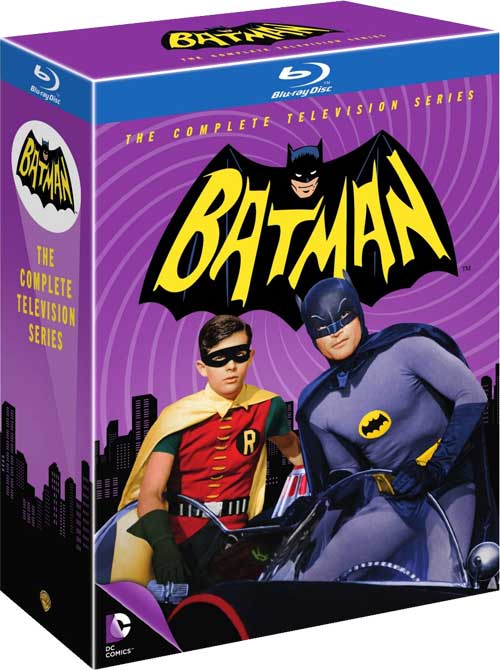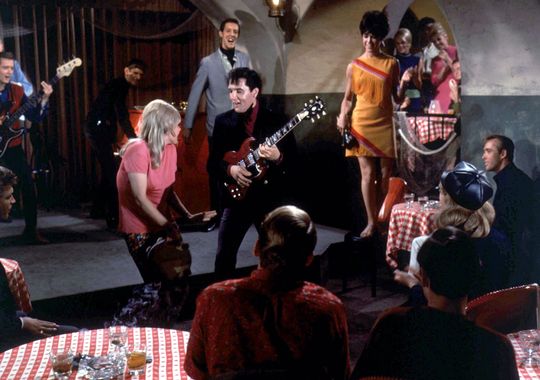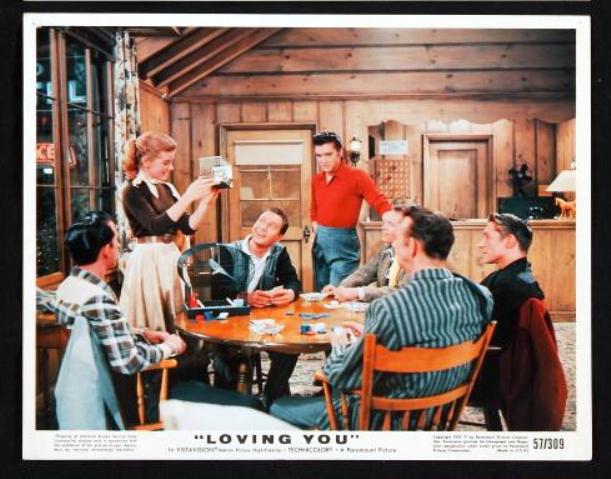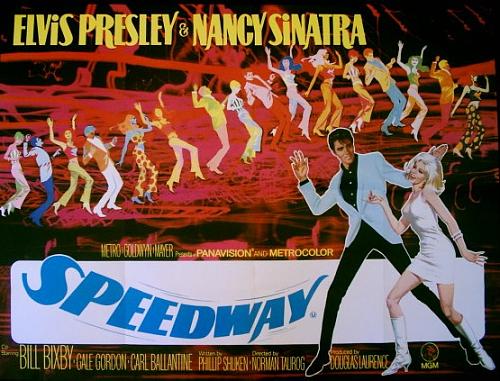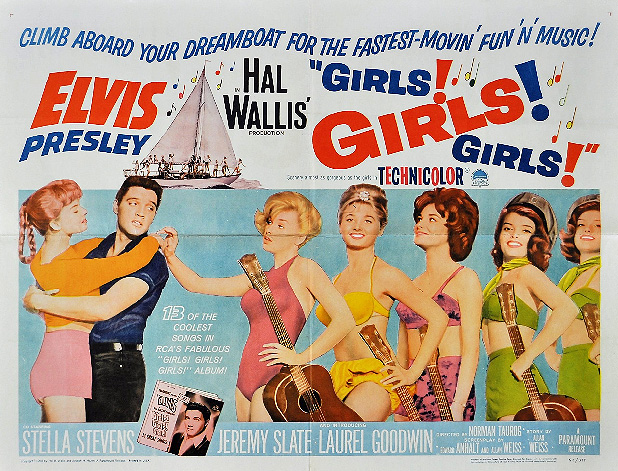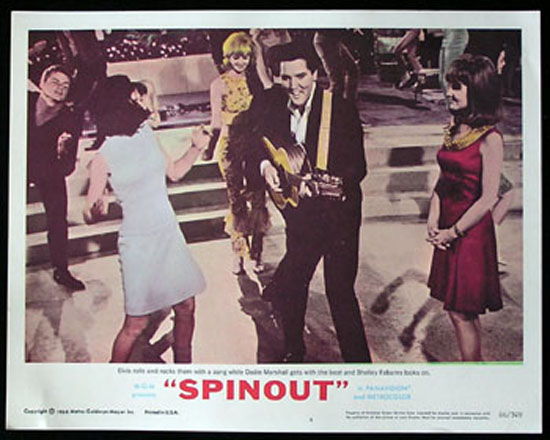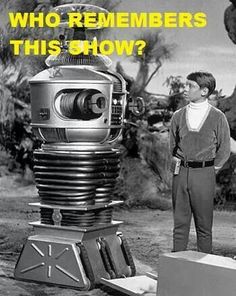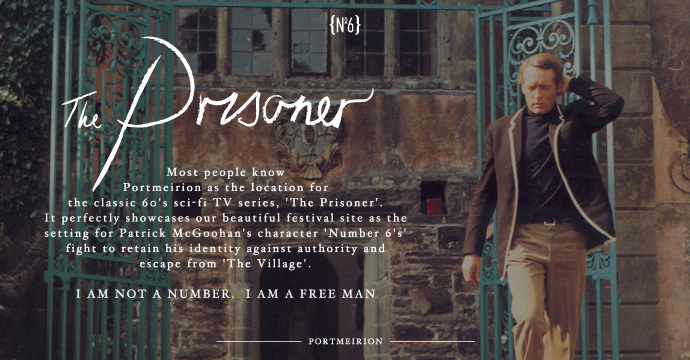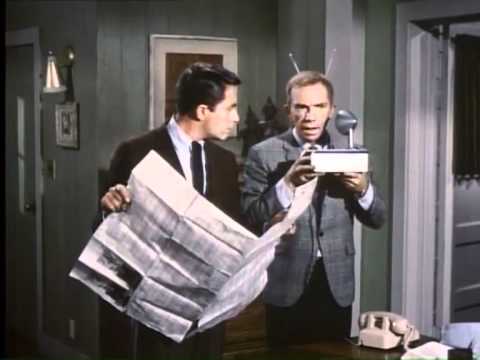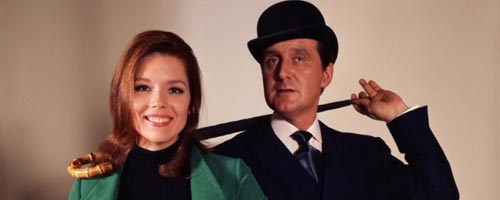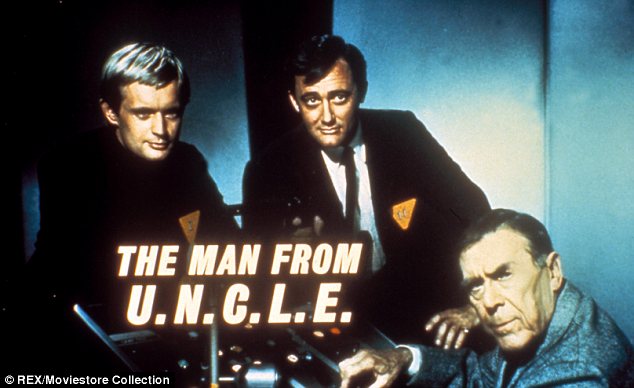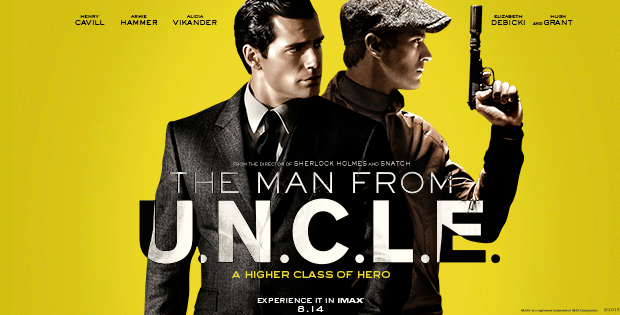 |
 |

Interview by Nigel Patterson, July 2015
“the last great series of star vehicles": Dave Marsh on the Elvis film canon Read EIN's detailed review of The Elvis Films
EIN: Jon, it’s great to talk with you today. Before we discuss your books including The Elvis Films and your passion for pop culture please tell us a little about the Jon Abbott story. JA: It’s a familiar one—like Elvis himself, and like a lot of British kids in the 1960s and subsequent decades, I was immersed in American popular culture, loved the music, the comics, the films, the TV shows, as I said in the book. I tried to get into writing either comics, or about TV, the comics stalled, and the TV writing took off, so I never looked back. There’s more to it than that, but that’s the short version. What I will say is that unlike most people who get into writing about film and TV, I had absolutely no interest in meeting “the stars”. It was the end product that interested me, and I was mostly motivated by the desire to a) keep the stuff being shown in Blighty, and b) spread the word. No DVDs or internet in those days, of course. We were entirely at the mercy of the broadcasters’ whims. Even when we could finally home-tape, the show had to air. What younger readers have to appreciate is the complete and utter lack of information back then, no IMDB, no Wikipedia, no Google, nothing. My generation literally clipped cuttings out of listings mags. I knew nothing about how American TV worked, but I wanted to learn. So when I had the chance, I read everything, talked to everyone. The episode guides in the book Fantastic Television, the first ever, were a revelation. My God, running orders, number of episodes, seasons! So I sought out program buyers and program sellers, made friends and contacts, rifled their files (with permission of course!), became the go-to guy for press offices or private individuals in the business for ideas and information, stuck my nose in everywhere, shot my mouth off in private and in print, wrote articles and TV news columns about what was being made, where and when we might see it. There was a three month lead time for monthlies in those days, which was just about right. You’d find something out in February, it’d be in print in April, the show itself could turn up anytime between March and December! It was ridiculously hard to get anyone to publish episode guides, which I had access to and knew everybody else like me wanted, so as well as my magazine work I ran a newsletter with guides throughout the ‘90s. The internet eventually killed my TV news business (I used to get it the hard way, ringing up, calling in…), so I’ve made it work for me, rather than against me. My books are available worldwide, thanks to Amazon.
EIN: Your recent book, The Elvis Films, is a delightfully fresh and off-centre approach to discussing the Elvis film canon. For me it worked so wonderfully because of your ability to weave together an abundance of facts, opinion and anecdote into an entertaining and informative examination of Elvis’ celluloid output. How have other Elvis fans reacted to your book? JA: Thanks. Actually there’s been a deafening silence mostly, if the Amazon reviews are anything to go by, but then I don’t seek out responses, I just go on to the next project. I should send out review copies, but I don’t. Fortunately, the books move anyway… well, all except the Cannell one, which just lies there like a dead fish! I only found your review because I clicked on my book cover on Google images out of curiosity! If the books are selling, and they are, I figure I must be doing something right. Books sell, or don’t sell, by word of mouth, and no amount of advertising or hype will work as well as someone saying to a friend “have you seen…?” or “hey, read this”. People are buying it, they’re just not reviewing it. I get the occasional idiot, as we all do, but when people get what I’m doing, it’s a joy. The weird thing about the reviews is that when people like my stuff they usually give reasons and examples, but the complainers say ‘oh, he got it wrong’ or ‘he made mistakes’ but rarely say where or how. That sort of criticism is useless, because you can’t respond to it. Why is it wrong? Maybe I can explain myself, or fix it. Often, what they mean is “I don’t agree”. I used to get some lovely letters to the magazines I wrote for, often asking for me by name to cover specific shows, but I only ever saw them if they were printed! Editors don’t like you to know how popular you are, for various obvious reasons, but it did slip out in a careless moment that my TV column in Video Today got more letters than the rest of the mag put together! I was always quite chuffed about that. EIN: Not surprisingly, given their teen focused/pop culture/‘B grade’ status, Elvis’ films featured many actors who were prominent in 1960s TV shows. Who were some of your favourites? JA: What we don’t have today is all those wonderful character actors, that’s what I love about the ‘60s and miss the most. There’s the chameleons, the guys like John Crawford, George Mitchell, Donald Harron, Harry Lauter, who the average punter doesn’t even realise they’re watching, and then there’s the specialists who they would go to if they wanted a certain kind of role filled, people like Joseph Ruskin, George Macready, Reta Shaw, Kathleen Freeman, Roy Jenson, Jonathan Hole, or Michael Ansara and Theo Marcuse of course! These are off the top of my head, there were hundreds! Remember all that corny vaudeville stuff that Guy Raymond and Stanley Adams did in Star Trek’s “Trouble with Tribbles”? They both turned up in the Elvis films. Stanley Adams was paired with Walter Burke, another great character, in Double Trouble. There’s no-one like them now. For about the last thirty years, with just a handful of exceptions (Seinfeld, Frasier, Friends, a few others), it’s been the handsome guy, the pretty girl, the best buddy (often the ethnic role), and the bald-headed boss who’s a bleep, over and over again, clones of clones. And nobody over forty! Where are the Mr. Mooneys, the Endoras, the Mr. Waverleys, the Doctor Smiths, the Miss Hathaways, the Colonel Klinks, the Aunt Harriets and Commissioner Gordons? All gone. It’s paint by numbers.
Rare film poster of the archetype Presley travelogue: Blue Hawaii EIN: When reading The Elvis Films I really liked the tangents you veered off in, informing the reader of the non-Elvis film and TV careers of many of his co-stars and the back story to his films. In my review I mentioned these diversions were both a strength and a weakness of the book. I see their strength being your adeptness at placing their context relative to the social and popular culture landscape in which they were made. I was concerned though that at times, e.g. in reflecting on King Creole, you wrote vociferously and most interestingly about the political, cultural and personnel back story but less about the film itself, and to me this resulted in an imbalance in the narrative. What is your response to my observation? JA: Fair comment. If I’ve nothing to say I don’t say it, but I’d rather include too much information than leave it out. It’s interesting, one recurring criticism of my books is that I give too much information about the actors’ other credits, some people said that about the Irwin Allen book. But for me, that cross-pollination is the fun of it. I love it that the same people will turn up in an Elvis, a John Wayne, a Batman, a Star Trek, a Lucy Show, a Time Tunnel… As you said, and as I made a big deal of in the introduction to the book, the USP was that it was about how the films slotted into the environment of the ‘60s and surrounding media, rather than just about the films themselves. I never like to do what’s already been done, I’m always looking for a different angle. I’ve turned down several suggestions from McFarland and Scarecrow because of that. Silly really, but there’s no great money in this, so if I’m going to spend at least a year, maybe two or three, on something, I’ve got to care. I’d dance like a drunken whore if it was big bucks, but it’s not, it’s pocket money, whether its mainstream publishing or self-publishing, so it’s my way or the highway. I can afford my principles! With Elvis, there was more to say about some films than others, I don’t deny it. There was virtually nothing to say about Kid Galahad! King Creole, in terms of content, is basically the middle ground between Loving You and Jailhouse Rock, it’s all been done. What makes King Creole is the musical content, with Loving You a close second. It’s pure Elvis at his peak. The buzz for me was that the bulk of the films are so similar, yet so eclectic. I was able to write about so many different aspects of 1960s pop culture, and yet still stick to the subject—sex, race, pop art, TV, the generation gap. I mean, where else will you find so much completely useless but, to me, fascinating trivia about Tickle Me!? I mean, who cares? Not your average Elvis researcher, or your general film buff. They either know all about Elvis, or all about films. Not often both. What Elvis fan knows or cares about Jocelyn Lane’s spy shows or Hell’s Belles!? Only me. But I think the detail on say, Sam Katzman, really helps you understand where Kissin’ Cousins came from, puts it in perspective. And I love that Harum Scarum went out in a double-bill with a King Ghidora film. I could be the only person who would have enjoyed both films equally! I had a ball doing The Elvis Films, the words just flowed. It’s not for everyone, I accept that, but my Amazon page makes it absolutely clear what you’re getting. People who want everything sealed into separate little boxes are not well served by my books. I embrace everything, not one show, genre, or category, that’s the joy of it. My forthcoming book on 1970s sex films takes in everything, comedies, comics, dramas, arties, sci-fi, horror, mainstream, the lot. It’s not just about plain old porn. Cool TV is as much about the ‘60s as it is about the three TV shows. They may not all like my books, but there’s nothing else like ‘em. EIN: There are so many interesting pieces of information in The Elvis Films. One is that a title song was written for Tickle Me. Could you share the back story to this and do you know who the songwriter(s) was (were)? JA: It’s been a while, but I’m fairly sure that information came from the Guralnick book. It only skims the movies, but it’s absolutely essential reading for anyone interested in Presley, I mean, start here, you know? As I recall, they dropped the song, but kept the now meaningless title because all the publicity stuff had been prepared! I love that, classic Colonel Tom! I’d say go to Guralnick, and if I’m wrong, I apologise. Generally, if it ain’t in there, it ain’t anywhere. EIN: You also mention that the ‘60s most popular sitcom, The Beverly Hillbillies, seems to haunt the book. Please tell our readers why you said this. JA: Well, it was one of those shows that just kept cropping up in the research. Follow That Dream is very similar in spirit and appears at exactly the same time, Max Baer played football with the guys, there’s Donna Douglas, Raymond Bailey, Phil Shuken… Bewitched, Burke’s Law, Batman and UNCLE kept turning up as well, as you might expect… and Star Trek, bizarrely, given its niche status at the time. Holy camp Blu-ray disc!!!
Due for December 2015 release in the US of A EIN: As I mentioned in my review of The Elvis Films you and I disagree on the final (non-Presley travelogue) phase of Elvis’ film career, the late ‘60s releases (Charro, Stay Away Joe, Live a Little, Love a Little, The Trouble with Girls and Change of Habit). I view them favourably (due to their attempt to reinvent, admittedly unsuccessfully, Elvis’ flagging film career through an ‘adult makeover’) while you term them “the dreadful mistakes”. What is it about the films in this phase that you don’t like and do any of the films have redeeming features? JA: They all had something going for them, and I mentioned those few things in the text. But “admittedly unsuccessfully” is not a description of a good time. I tried to be fair, but it’s not just the Elvis films, the whole of American cinema seemed to be lost during the late ‘60s, absolutely clueless and out of touch. Then you get that artistically wonderful but financially poor early ‘70s period, and then along come Spielberg and Lucas. Yuk. Have you read Peter Biskind’s Easy Riders, Raging Bulls covering this period? It’s a revelation. EIN: What alternative approach would you like to have seen adopted to try and reinvent Elvis’ film career or was it a case that Elvis should have gone back to live performing earlier than he did?
Still from Easy Come, Easy Go JA: I think Easy Come Easy Go proves conclusively that the traditional Elvis movies were over, but I loved the so-called Comeback Special when it was just him and the boys and I think that was the way to go. But the ‘70s was the decade of bad taste, and Elvis was a part of that, there’s no denying it. He made some terrible musical choices, and some terrible lifestyle choices, and the colonel lost the plot when the movies ended, let’s face it. But Elvis was a big sheltered man-child who could have anything he wanted, and frankly it was a hell of an achievement that the colonel kept him alive into his forties. Look how much earlier all the other icons went. EIN: The mid-70s appeared to provide Elvis an opportunity to resurrect his film career when he was offered or at least had discussions about co-starring with Barbra Streisand in A Star Is Born. Do you think this was a missed opportunity? Would Elvis have been up to the challenge? JA: When you look at what the colonel said no to (in terms of film projects), I’m totally with him on all counts. It’s in my book somewhere. First of all, I can’t stand Streisand, but personal opinions aside, look at the plot. Elvis gives up his career to protect hers? Really!? And that biopic about a C&W singer… that’s like asking John Wayne to portray Roy Rogers. And Mae West in Roustabout? He protected Elvis far more than people acknowledge. EIN: The visuals in The Elvis Films. I was disappointed that there weren’t a lot more, preferably also in colour and of a higher visual quality. What was the reason you didn’t include a greater range of visuals? JA: I agree, but there are some great pics in there. And I love the cover, if I say so myself. As I said in the book’s introduction, The Elvis Films, as a relatively small project, was the ideal guinea pig for me to try self-publishing. I went from using an archaic word processing system (WP5.1) on discs and a box-sized computer and screen to Apple MacBook Air and Createspace overnight, jumping completely over the last twenty years of the infuriating Microsoft, which I dreaded facing working on when Old Faithful finally crashed (which it never did), so it was a huge learning curve. In the last year, I’ve formatted three existing texts into three self-published books, and (with the aid of my tutor, obviously, a miracle worker who solves every damn silly thing I throw at him) I’ve done everything myself—designed the interiors, picked the art, selected the fonts, formatted the text, designed the covers, proofed and indexed… it’s been a massive and quite exhilarating experience. As proud as I am of The Elvis Films, inevitably, my subsequent two books, one 500 pages, the other 700 pages, do look better. To re-do The Elvis Films would be terribly unfair to the people who have already bought it, and I think it’s okay as is. I’ve never yet had a book out there I’ve been ashamed of or embarrassed by. I have considered color, but my writing is already highly specialised (non-fiction doesn’t sell as well as fiction), and I don’t want to price myself out of the market. There are also, of course, copyright issues as to what I can legitimately use. I have, for example, some wonderful magazine pictures of Elvis filming supposed exteriors of Fun in Acapulco in the studio, but I don’t have the right to use them. I have to restrict myself to freely available promotional materials, and can only use it for its specified purpose, which is to illustrate and promote. I mustn’t exploit or infringe, and color might be pushing it. Quality of the visuals, well, there are limitations with self-publishing, but Createspace are getting better all the time, I’m getting better all the time, but we can only go as fast as the engine. I’m learning new tricks every month, and so are the guys making the technology. Apple’s support service is phenomenal, they don’t just sell you a computer and kick you out of the door. To be honest, I’m in awe of it all, if only I could have accessed this technology ten, twenty, forty years ago, my god, what I could have achieved!
Lobby card - Loving You EIN: It has been suggested by some analysts that because of Elvis’ status as the first mega-teen star in an increasingly mass production/profit driven/lowest common denominator entertainment industry, his film career was never going to be allowed to evolve like the film careers of Bing Crosby and Frank Sinatra did. Is this a valid observation? JA: Did their film careers evolve? Crosby did the same reliable shtick every time, and who can name a Sinatra film that wasn’t a musical? Ocean’s Eleven maybe, but who remembers Tony Rome or Dirty Dingus McGee? Elvis surely had a more varied career, and as you know, I and the mass audience preferred the formula stuff. I must say I hate “film studies” where the writer pretends he or she’s above the subject and looks down on the audience as if they’re mice from Mars. Popular culture is us. I tried to analyse why people went to see G.I. Blues, because I hated it. But “we” wanted Blue Hawaii and Girl Happy too, and so did I. So it’s a “mass production/profit driven/lowest common denominator entertainment industry”. Good! So it should be! Doesn’t he or she like movies? These so-called analysts talk about the entertainment industry in this sterile, derogatory way you describe, but we are the audience, the industry is us, all of us. If the industry is the horse and instead of looking at the beauty of the animal we’re following it with a bucket and a shovel, whose fault is it if we look in the bucket and see crap? And who’s to say it’s crap if people like it, want it, choose it? People flock to reality TV, The Da Vinci Code, Jeffrey Archer, Barbara Cartland, Fifty Shades, even though “everyone” agrees it’s crap. Having said that, the popular culture that endures isn’t always what is popular at the time. The classic pop music that has survived is not made up of all the trashy long-forgotten number one records. A lot of great tracks we revere never made it to the top ten. But the good stuff endures, the flash in the pan burns out. That’s not just true of music, it’s true of films, TV, books, comics, everything. I find that immensely encouraging. It’s nothing new, either. Look at the Impressionists. They were reviled. People wanted cows in fields, portraits of fat men and plain women. But quality will out. Popular culture, music, TV, film, whatever, is defined by what we want. Then we re-evaluate it over the years and decide what we want to keep. There are basically two forms of ‘word of mouth’. One is advertising and media, which generates interest and makes people feel they ought to see, hear, or read something, and which dies when the hype ends. Look at Avatar, it broke box office records. Who cares now? The other is friends telling friends, relatives telling relatives, dads and mums telling their kids, where interest is generated and perpetuated because something is good. That’s the stuff that’s timeless. Kids watching The Flintstones, Batman, Star Trek, or The Simpsons with their dads. The media says hey, look in the bucket, everyone else is… but eventually we look up and see the horse, not the horse’s ass… EIN: What is your view on the Colonel’s role in Elvis’ film career? I ask this question in the context that in The Elvis Films you quote Memphis Mafia member Lamar Fike who said “This isn’t a popular view but the Colonel’s formula was correct. The serious stuff – the movies that didn’t have many songs in them – flopped”. JA: It’s like Frasier and Bebe, his agent. The Colonel was a dreadful, awful man, but he protected him, kept him alive for twenty years. It was a strange relationship, they both needed each other equally, but it worked. He was the father figure. Imagine Vernon in charge. And I quoted Lamar in the summing up because he’s so right. Everyone says the films are awful, but everyone went to see them. If the films had died, if the fans had rejected them, Elvis would have been straight back in the recording studio. But in the ‘60s, they went to see Everything. Everything. So this is either the riddle of the ages, or the paradox to end them all, or somebody’s lyin’. My book addresses this at length. People say, oh the fans would have watched him in anything, they just wanted to see Elvis so they tolerated the films. Really? 31 of them? For fifteen years? Could the market sustain 31 bad Bond films in a row, 31 bad Disney/Pixar, 31 bad John Wayne films? Rubbish. Fool me once with Blue Hawaii, and shame on you… but fool me repeatedly with Spinout, Speedway, Clambake…? What would, or should, Elvis have been doing? The answer appears to be, exactly what he was doing. Box office doesn’t lie, but people do. If people came out of the cinemas griping, it was probably the quality of the songs that disappointed. Everyone agrees they were one third good, two thirds poor.
Rare film poster - Speedway EIN: And what about the role of Elvis in his own career? You note in The Elvis Films that there is no known record of him choosing scripts, rewriting lines, changing dialogue on the set or wanting to direct. If Elvis hadn’t been acquiescent could his film career have been materially different? JA: But should it have been? At the height of his success, when he was making these supposedly awful films, they were making three a year! They couldn’t churn them out fast enough! He was working for three or four studios at a time. Some people paint him as this rock and roll rebel, but you know, the truth is—he wasn’t. He loved his family, the church, and the flag, and ironically, he hated the drugs culture. I covered this in the introduction and the early films segment. The fact is, his teen audience grew up alongside him. They settled down, had kids, went to the family films, dreamed of holidays in Hawaii, bought the MOR stuff in the ‘70s. There’s a few frazzled old rockers out there who can’t accept that. What we do know, and I said this in the book, is that Elvis hated some of the songs he was given. But that’s the one place where he could have put his foot down, and he didn’t. You have to ask why, and none of the answers are pretty. EIN: Will Elvis’ body of film work simply be an artefact of 20th century teen culture or can it survive as an area of interest for future generations? JA: Who knows? He has a wonderful voice, that’s the bottom line. It’s recorded, on film and on disc, and it’s out there. At three o’clock in the afternoon, or three o’clock in the morning, it can melt you. In the ‘80s a new generation of kids found Bilko, Thunderbirds, The Munsters, Lost in Space… and took from them different things than the original audience. They watched them in a different way. Thunderbirds and Lost in Space weren’t futuristic and forward-looking any more, they were kitsch, camp, and retro. Sky’s original MD, who came over from Australia, told me that when they re-ran The Munsters over there, the kids thought it was a new show. They thought it was in black and white to emulate the source material. The BBC have kept piles of stuff which they flagged as important and that no-one wants to see, and wiped forever recordings that we’re now desperate to retrieve—Hancock, Dr. Who, Peter Cook and Dudley Moore, all gone. We have to preserve everything, because nobody, but nobody, knows, including me. If you had told me in the 1980s that in the 21st century I would have Charlie’s Angels on DVD, but wouldn’t be bothered about Lou Grant, I’d have thought you were insane. But Charlie’s Angels, which insulted my intelligence at the time, now looks kitsch and quaint and campy, while Lou Grant, despite its undeniable craft and quality, now seems irrelevant, preachy, heavy-handed, and dated. The Adam West Batman is rightly revered and frequently revived, but nobody cares about UNCLE, only the die-hard fans. That breaks my heart. But if Tarantino had made his UNCLE film, who knows? My daughter frequently goes to see films based on old TV shows and doesn’t even realise it. 21st century cinema bores me to tears, but they seem to be giving the public what they want. And “the public” is the under-forties, and I’m now in my fifties, so no mystery there. But I don’t get Star Wars, which came out when I was in my early twenties. So banal and derivative next to absolutely everything else in pop culture from Buck Rogers onwards, yet it’s bigger than anything. From 1936 to 1976, what wasn’t superior to Star Wars? But then I was born in 1956, so I grew up with Lee and Kirby Marvel Comics, Weisinger’s Superman family, Gerry Anderson, Irwin Allen, Doctor Who and the Daleks, the original Star Trek, UNCLE, Batman, The Outer Limits, The Twilight Zone, The Invaders, all the 1950s pulp sci-fi films… If I’d been born ten years later, in 1966, I’d have grown up in a sci-fi drought. To those kids, raised on Tom Baker and the bionic man, Star Wars obviously blew them away. To my eyes, it was a cynical, inferior, one-dimensional rip-off of a dozen things that were better. To other people, it’s the meaning of life. So whether something is wonderful or rubbish can be based purely on personal perspective. I was ten years late to Elvis, so I like the movies. A wise man once said “the golden age of anything is when you’re twelve years old”. Still, the ongoing adulation for Star Wars reminds me of that wonderful Jerry Seinfeld joke about Chinese food—they’ve seen the knife and fork, but they’re sticking with the chopsticks! I write about this stuff because I want to keep it alive. I love it, and I want other people to find it and love it. I’m very fond of pointing out at the moment that old TV is everywhere except on TV (in Britain, at least). Collectors’ fairs, t-shirts, mugs, posters, books, comics, coasters, DVDs, retro this and that, all over the internet, Amazon, You Tube, e-bay, Google Images, you name it, but not on TV. Even the Elvis films aren’t on TV any more (here in the U.K.). Bond, the Carry Ons, John Wayne, the tiniest handful of often ill-chosen off-peak re-runs, and that’s it. Sixty years of television, but the people in charge can’t remember anything earlier than The Simpsons. They don’t know the history of their own industry, they watched The A-Team when they were toddlers. That’s when I started writing professionally. They don’t know Hill Street Blues, let alone UNCLE. I don’t know of any industry so ignorant of its own history as television.
Film poster - Girls! Girls! Girls! But… the kids don’t actually watch TV on TV any more. Marshall McLuhan, the guy who predicted the global village, said back in 1952… 1952!… that’s before Adventures of Superman aired… that one day television would be considered an art form, but it would no longer be on TV. How right he was. I’m running on, but here’s a couple of anecdotes if you’ve got the space or the inclination to use them. I carry my office around with me on my computer in a bag with Top Cat on it. All the time I get warm comments, at least once a week, and it’s always “why isn’t it on TV any more?”. And I laugh and say treat yourselves to the DVDs, look on the net. When my Apple guy was helping me with Cool TV of the 1960s, my follow-up book after Elvis, he asked me about The Man from UNCLE and I was telling him how big it was in its day… As we spoke, he leaned over to his keyboard, and called up every episode onscreen, legally available, and sampled the first few minutes of the pilot to see what I was on about. So there’s the future. You’ve just got to do what I’ve been doing since 1983, and spread the word. By the way, my wife is five years younger than me, so she completely missed the UNCLE phenomenon. When I was nine in 1965, she was four. When she first saw a still from UNCLE in the early ‘80s, she said “That’s The Invisible Man!”. A completely forgotten half-season run in 1975, plus repeats, and that was her reference point. Five years difference. About ten years ago, pre-internet (for me), I went into HMV, a high street DVD shop currently in dire straits, and asked if they had The Man from UNCLE on DVD. The guy said maybe, but you’ll have to tell me who he is! No, I said, that’s the title! So we’ve got our work cut out for us. In fact, it was when Tickle Me came out on DVD that I discovered Amazon. HMV said they weren’t going to stock it, but they could order it for me, ten days, come in and get it. Not stock an Elvis film! I knew my daughter used Amazon, so I asked her to look for it for me. She said give me your wants list dad, and within half an hour I’d ordered forty films I’d been desperate for, gladly spent a hundred quid. So after that there was no looking back, and it was goodbye HMV, goodbye high street, goodbye region two only. All because they weren’t going to stock Tickle Me! So there’s the future. It’s up for grabs. EIN: After watching and re-watching Elvis films have you formed a view on which directors got the best out of Elvis? JA: Well Siegel didn’t want Elvis, and Elvis certainly didn’t need him. Elvis was always polite and professional and prepared, we know that. But all he needed was traffic cop directors, no shame in that. But only Wallis got the formula right. When they copied him, they got it right. Those were the money makers, so those were the ones that worked.
Lobby card - Spinout EIN: Jon, what are your favourite Elvis films and why? JA: I hate to keep saying it’s in the book, it’s in the book, but it’s in the book! From Blue Hawaii to Speedway and Clambake. All the fun stuff. Viva Las Vegas is probably my favourite non-sf film. Jonathan Harris of Lost in Space, one of my TV idols, said that the audience expects you to do the same thing every week, and woe betide you if you forget it. He didn’t mean it quite so literally, but I know what he meant, and he’s right. People go to see an Elvis film, or a John Wayne, or a Doris Day, or a Dirty Harry, or a Die Hard, and you had bloody well better give ‘em what they came for. Disappoint them at your peril. EIN: And what do you regard as the worst Elvis film or films and why? JA: Sorry, Nigel, you know the answer to that one! I’m afraid I won’t be changing my mind. The very worst has got be Change of Habit though… That one stinks on so many levels. EIN: Elvis films as “guilty pleasures”. Why is it OK to enjoy watching an Elvis movie? JA: We call them “guilty pleasures”, and I’m “guilty” of using that term too, usually when I’m sitting in front of a Godzilla film, or something smutty, but you know there’s no prizes for sitting in front of a 24 hour news channel and getting depressed, and a good game show is “better” than a bad documentary. I love Italian opera, but it’s better experienced through earphones or seen on a stage than on TV, especially as the BBC pander to the snob element. If everybody who said “Oh, my husband likes the sport, and I only watch the wildlife documentaries and the news” was telling the truth, why is the TV top thirty here in the U.K. dominated by twenty-five episodes of soaps and freak shows for morons? But I don’t think people are so snobby as they used to be. We don’t defend ourselves so much these days, we just indulge. People openly discuss the dumbest reality shows round the water cooler. My personal criteria for non-fiction, because obviously this doesn’t apply to Bond villains or Basil Fawlty, is that I don’t want to watch anybody on TV who I wouldn’t have in my house… so I’ll watch QI and all the similar panel shows, anything with David Mitchell or Jimmy Carr, but not car crash TV, Jeremy Kyle, or the Kardashians. But these days you’re more likely to be mocked for saying you don’t watch the Saturday night crap. But I really don’t. On the other hand, I’m a grown man watching Space Ghost or Fireball XL-5. So it’s all relative. Each to his own. A better question would be why is it not okay to watch an Elvis movie? Why is it okay to have sex? Why is it okay to eat a splendid meal? Put it like that and you realise what a strange question that is.
JA: Because more than anything else it tells the truth about us at any given time, any chosen decade. Elvis, Playboy, Cosmopolitan, John Wayne, James Bond, Carry On, MASH, Happy Days, Rambo, Schwarzenegger, The X-Files, Jerry Springer, Big Brother, the stuff we choose, the charts, the ratings, the box office, the sales figures, they don’t lie. The media, although part of the popular culture, the BBC, Fox News, the tabloids, academia, the pressure groups, the special interests, the axe-grinders, the advertisers, they all lie because they have an agenda, they’re politically motivated, they’re social engineers. But their lies also tell the truth about us. As I say in my book on sex films, I’m a guy, I like to look at naked girls. There, I said it. But to watch TV or read the papers, with their censors, “regulators”, “standards”, and earnest, finger-wagging, furrow-browed pundits, you’d think that it was just me. I make this point, one way or another, in every book I’ve written, it’s in there somewhere. I am basically a good, decent, kind, honest man, if I say so myself. I just happen to like violent movies, sex films, trashy pulp TV, dirty jokes, childish cartoons… but I’m not some solitary weirdo, living in a pure and pristine world of superior beings, these are commercial mass market entertainments enjoyed worldwide, so it’s not just me. Other people lap up questionable or lowbrow things I don’t—celebrity scandal sheets, tabloid TV, disaster porn, serial killer films, banal pop music, genteel murder mysteries, money-grabbing game shows… What we really read, watch, look at, and listen to while we lie to ourselves and others is what we actually seek out, pay for. That’s popular culture. Until all of us, men and women, can be honest about what we want and like, we’re doomed to live lives of misery and frustration… and we only get one life. Pop takes no prisoners, it lays us bare. Did you laugh at that joke, or didn’t you? Why are you playing war games on your computer? Why are you lusting after that good-looking man or woman and not the fat ugly one? Why is afternoon television full of fictional murders? Suddenly all that political correctness, the phoney sexual politics, the posing and posturing, the complaining and tutting, the petitions and filling in forms, the indignant letters, the pious disapproval, it all looks pretty damn stupid. We’re back to guilty pleasures. I’m not saying lap up any old rubbish and ignore the arts. I’m not saying dismiss morality, spirituality, or conscience. I’m not saying we should all behave like Henry Miller. I’m just saying be honest about who you are and what you like. Stop all this raging hypocrisy. I’m a middle-aged man, but if I want to watch Yogi Bear, or a man in a Godzilla suit trampling cardboard buildings, or Flying Disc Man from Mars, or Maria Forsa having an orgasm, well, that’s me sorted. I’m off to my wall of DVDs and the bores and dullards can watch mainstream TV. Sucks to be the rest of you! Okay, I’ve finished! You did ask. EIN: Your book, Irwin Allen Productions 1964-1970: A Critical History, is an engrossing examination of four of television's most exciting and enduring science-fiction series: Voyage to the Bottom of the Sea, Lost in Space, The Time Tunnel and Land of the Giants. One element that many readers appreciated was your impressive episode by episode evaluations for each show (my copy of the book is very dog eared!) This must have been a labour of love! How long did it take you to research, watch and write this release, and what revelations did you discover as part of the process? JA: I can’t say I learned much, it was more about passing on what I already knew and wanted to say to likeminded people. I learned very early on in life, because I thankfully came from a time and was raised with a family that didn’t spare your feelings, and there was a lot of laughter and joy at other people’s expense, that nobody else I knew was remotely interested in all my useless trivia! So I wrote to get it out of my system, and sent it to magazines where people shared my interests. Even today, only a handful of my friends and acquaintances in “the real world” have even the vaguest idea of what I do, and I only tell them if I’m asked. That means that when I’m “off duty” I’m truly relaxing. Then I go back to my own little world. But I won’t deny I enjoy those rare moments when someone says “oh my God, you’re Jon Abbott!”. But mostly they don’t, and I can tell you for a stone cold fact that none of my family have read barely a word I’ve written! My daughter walked in the room once, took one look at the rubber monster stomping around the Seaview, and said “My God, Dad, you do watch some crap”, then walked out again. I was laughing for days. Days. No, they couldn’t care less.I say I didn’t learn anything from writing the Irwin Allen book, that sounds a bit arrogant, but I do know most of the Allen shows back to front. UNCLE and Batman were a joy, because I got to rediscover the shows. I’d cherry-picked a few Batman off-air, and been seeing the UNCLE movies fairly regularly, but I’d just bought UNCLE on DVD, hadn’t seen it for a while. The Cannell book was a voyage of discovery, the Elvis book was a breeze but I had to do a lot of reading, and the book on time travel movies and TV I’ve got lined up was absolutely fascinating to research. Firstly, I had to look up all the history, which is never dull. And then when I started I thought there were maybe two or three dozen movies? There’s hundreds. It’s difficult to say how long any book takes, because I’m always working on several projects at once, and the commissioned work comes first. With the Irwin Allen book, I was always watching one series or another, sometimes watching an episode specifically to write about it, sometimes just for pleasure and noticing something. Eventually, of course, I got to the point where I had to start filling in the blanks. I take notes in longhand initially, then type it up while I can still interpret my scrawl, then rethink, revise, rewrite, re-read. At least half my work-time is spent re-reading and re-writing, and although that sounds like a slog, it’s the part of the process I most enjoy. The blank page is a terror. It sounds silly, but if I freeze I just start by “talking” to the page, as if it’s asked me a question. I answer very bluntly and simply, and then slowly the clever stuff appears.
EIN: Stephen J. Cannell created, wrote, story edited or produced some of the most recognisable TV series of the 1970s to 1990s including The Rockford Files, Adam-12, The Greatest American Hero, Baa Baa Black Sheep, Hunter and Hardcastle and McCormick. Your 2009 book, Stephen J. Cannell Television Productions: A History of All Series and Pilots, is a comprehensive coverage of Cannell’s series. Many of Cannell’s series had somewhat flawed or reluctant protagonists. You note that Cannell changed the face of the action-adventure genre. Please tell us about this. JA: It’s all in the book, but very bluntly, he put the humor into a rather absurd genre that took itself far too seriously. The chapter on The Rockford Files says it better than I can here (“His gun is deadly, mine’s in the cookie jar!” is a great line!), and the sections on Greatest American Hero, Riptide, and The A-Team are among the best things I’ve ever written. All the other shows then followed his lead, Magnum and Moonlighting for example, but it was the movies that did for him, because franchises like Lethal Weapon and Die Hard, and one-offs like Blind Fury and Cliffhanger, basically did what Cannell was doing, but on the big screen, with huge budgets. Of course Cannell himself was influenced by his predecessors, the Republic serials and early buddy shows like UNCLE and I Spy, as well as contemporaries like Eastwood and Altman, but his personal legacy is enormous, massive. I started the project back in the very late ‘80s, when he was still working, because all the attention was going to Bochco and MTM, attention they deserved, but no-one seemed to be noticing Cannell except a handful of TV buffs. He was getting lumped in with his old muckers Glen Larson and Donald Bellisario and all that grey-haired Silverman/Hargrove crap, and that just wasn’t right. I wanted the book to give him contemporary recognition for what he’d accomplished and was doing then, but it ended up a history. I’m glad he saw it and liked it though. His people asked McFarland for a contact address, and I okayed it, but a few months later he was gone. Damn shame. EIN: You have a number of other books released in 2015, Cool TV of the 1960s: Three Shows That Changed The World and Strange New World: Sex Films of the 1970s. Please tell us about them. JA: Can I just be real lazy and direct everyone to my Author’s Page on Amazon? It’s all there, exactly as I want to say it, and Cool TV is already out, with Strange New World due in July. It’s late because when I got the proof, what looked fine on the computer screen didn’t quite cut it on the page, so I’ve completely reformatted it, and that meant another couple of weeks re-doing the index! But it’ll be worth it when it’s ready. I’m super-pleased with both of them. EIN: Jon, I have to ask, as a child of the 60s which TV show trading cards did you collect? JA: Literally anything with a TV connection. If it wasn’t related to a TV show, I just wasn’t interested. If it was, I wanted it. And that wasn’t just cards, it was toys, comics, mugs, models, you name it. The most exciting time of the year was Christmas, because that was when the Annuals came out… and they were good-looking books in the ‘60s, thick and on good paper, with some thought and effort behind them, less so as the ‘70s wore on, and rip-offs today. Now it’s basically one comic, in hardback. The Tom and Jerry annuals for 1971 and 1972 could almost be subtitled “The Best of Harvey Eisenberg”, and Leo Baxendale used to illustrate his own characters for the Odhams books, he didn’t farm ‘em out to other artists. As a child, every year I asked Santa for the TV Comic annual! I had to have it! I still collect cards now, got books of ‘em. My memories are Hanna-Barbera sweet cigarette (!) cards, now called candy sticks but without the cards, and when I was about fourteen, me and my two school mates collecting Star Trek (“What Are Little Girls Made Of?” with the blue borders) and Land of the Giants. I had the full set of Star Trek, and a few years ago I obtained the one card I was missing from Land of the Giants! I also remember everyone collecting the monochrome Beatles and UNCLE cards with the fake autographs. How weird was that? Love cards. I’m a total trading cards nerd. EIN: Do you recall a little known single season (1961) British thriller, The Mask of the Clown? I ask as someone who fondly remembers this program (apparently tapes still exist of all episodes) and who discovered that the legendary Brian Clemens was the script writer (Clemens aka Tony O’Grady is notable as the writer of episodes of classic programs including The Avengers, The Invisible Man (1959), Thriller, Danger Man, The Professionals and Bugs). JA: Sorry, no. If it’s out there, I’m surprised no-one’s released it on DVD. Network do that sort of stuff.
The late Patrick McGoohan as 'Number 6' in the seminal television production "The Prisoner" .......I am not a number. I am a free man....... EIN: Patrick McGoohan’s seminal series The Prisoner. As a teenager I was transfixed by this obtuse, complex show and one which, at the time, I struggled to understand. How did this series impact you? JA: When it was first on, I was eleven years old, raised on Bond, UNCLE, and The Avengers, and took it all at face value, quite literally. It was repeated when I was about fourteen, and then I got it. I saw it again when I was in my early twenties and was greatly amused at the thought of grown adults puzzling over “the meaning” of what was obviously a satirical microcosm of British society, free but not free, free as long as you fit in and conform. The Tally-Ho was obviously the Mail/Express, the cheery loudspeaker you couldn’t get away from was the BBC, Number Two was faceless officialdom, the bubbles were the police, the heavy mob. How could you not get it? It was the subject of the first full-length article I ever had published, in Starburst magazine. There was a fan club that was filmed for a Channel Four documentary dressed in all the gear, running around the London locations, acting out scenes from the episodes. I casually and I thought harmlessly referred to them in the piece as “a weird little fan club” and one of ‘em wrote to the mag saying they weren’t weird, and that the meaning of the show was still open to debate. My god, in the last episode of the show everything is labelled! So that was the beginning of my controversial writing career. Embrace your weirdness, that’s what I say. Otherwise you just come across as really weird... EIN: McGoohan’s themes of individualism (retaining one’s identity), conformity, state control, rebellion, etc are as relevant, arguably even more relevant today, as they were in the swinging 60s. Do you agree? JA: Absolutely. Timeless, even today, with everyone so much more tolerant generally, but super-intolerant of certain opposing views. In those days, non-conformity was all about the counter-culture, being wacky and offbeat, not wanting to join the rat race, and so on. Today, it’s more about everybody thinking and feeling the same about “issues”, no dissenting from the approved view, and facts, feelings and opinions be damned. You’re assumed to be on message, and so is everyone else. “We” have decided what is “okay” and “not okay”, and even more sinister, what is “true”. It’s extraordinary the absolute nonsense people will just take on board without an iota of evidence or common sense. It used to be about empirical proof, now it’s about what we choose to believe, then force the facts to fit. If you can’t buy the scientists, bury them. As a free-thinking individual, all you need to do is just think, think for thirty seconds, can this be true? Can it? How can it? When I was a kid, the two words you heard all the time in the playground were “prove it”. Someone was quoted in the press just a few days ago, complaining without a hint of irony or shame, that no-one would take his opinions on board because the scientific community was demanding double-blind proof with placebo testing, but he felt it was “too important” to wait for the results! And the newspaper just printed this as a valid opinion! He hasn’t got time to wait for the evidence! It’s terrifying, beyond satire. Having said that, South Park’s done some wonderful stuff on “accepted wisdom”—the day after The Day After Tomorrow, and the smoker being beaten up outside the Museum of Tolerance and all that… But when university professors are telling their students “there’s no such thing as a fact” you know we’re beyond hope. What did they say in The Prisoner? “Questions are a burden to others”. I’d like to boot them out of a top floor window and prove gravity to them. EIN: I found the 2009 remake of The Prisoner starring Jim Caviezel (Person of Interest) and Sir Ian McKellen (X-Men; Lord of the Rings) interesting but ultimately disappointing. What are your feelings about it? JA: It might sound odd, but I’ve never seen it. I used to reluctantly watch these reboots and revamps because I thought I ought to, but they’re all so bloody awful and just such an obvious bad idea that I mean to, just to have an opinion, but often just don’t get round to it. I used to say to my wife, I’ve got to watch this, people will ask me about it. Now I just think, you know what? Life’s too short. I figure if it’s a surprise success, like Doctor Who was, I’ll hear about it. It’s tough enough watching the ‘return of’s…’ with the original cast, only older. I still haven’t seen The Avengers with Fiennes and Thurman, Wild Wild West, I Spy, or Get Smart, just off the top of my head. I’ve only seen about twenty minutes of Lost in Space, introducing the characters, and a bit from the end. The only ones I liked were My Favourite Martian with Christopher Lloyd (but then I had no nostalgia for the original), and oddly, The Green Hornet, which I thought was both fun and respectful. There was a moment when I expected a blast of the original theme, but they didn’t! But I know I’m in the minority with both. I’m also in the minority with the Top Cat movie. Yes, the story and the bad guy sucked, but there was a lot of fanboy stuff in there that I loved. It was a brave try. Such a shame they screwed it up. But they did. I suppose the best way to do a 21st century version of The Prisoner would be to tackle things like political correctness, eco-twaddle that defies scientific fact, an “obesity epidemic” that completely misunderstands the words ‘obesity’ and ‘epidemic’, and the anti-smoking fascists, who have undone forty years of steady anti-smoking progress with their draconian bullying. There’s no shortage of subjects. The reactionaries hate everybody, of course, always have, always will, but the liberals are weird. There’s always a couple of groups it’s okay to persecute with the full force of smug self-righteousness, and another couple of segments of society that are golden, immune to being criticised or questioned about anything.
My Favorite Martian (1963-1966) everyone's favourite "Martian" - at least in the 1960s Uncle Martin (Ray Walston) with his "Earthling" nephew, Tim (Bill Bixby - Elvis' co-star in Clambake and Speedway) EIN: Jon, sadly, another of the icons of popular culture television, Patrick Macnee, passed away recently. He shared an interesting trait with the late Patrick McGoohan in that they both would not act using guns (McGoohan refusing that his Danger Man character, John Drake, use a gun and Macnee suggesting a classy umbrella instead of a gun for his John Steed character in The Avengers). How do you rate The Avengers and The New Avengers in the pop culture television hierarchy and what is your view of Patrick Macnee (the dapper and cool John Steed) as a pop culture icon? .....JA: Very sad, but at least he had a good run and went peacefully. Guns in action films are like swearing in dialogue, if you can’t use ‘em it makes the writers work harder. Taxi’s Louie de Palma, for example, was much wittier than Eddie Murphy in Beverly Hills Cop because he had to be. That said, swearwords are hilarious when used sparingly, and I love a good shoot out Chow Yun Fat style! Let’s face it, Danger Man was a snore-fest, and UNCLE was never more exciting than when they pulled their guns out! Calling Doctor Freud…!
I think the Emma Peel era of The Avengers and The Sweeney are equally placed at number one for the Greatest British TV series of all time, and are likely to stay there! I would place John Steed, with Emma Peel, as the number one TV icons, most of the others are probably sit-com figures. The New Avengers was a very troubled series, as we know, and like most revivals was probably best not attempted. I realise it’s difficult to leave these things alone given the profit potential and the lack of good ideas, but they rarely work out. The biggest problem The New Avengers had was that the 1960s was the epitome of creativity and style, and the 1970s was the exact opposite. I’ve always said I wouldn’t have wanted to see a 1970s UNCLE, and I feel the same about The Avengers. The New Avengers proves me right. Both series closed just in time in my opinion.
Mrs Peel.....were needed! The late Patrick Macnee (the urbane John Steed) and Dame Diana Rigg (the immaculate Emma Peel) in The Avengers EIN: Please tell us more about some of your favourite TV shows from the 1960s? JA: Whew, yeah, back to escapism, please. It’s quicker to list the ones that disappointed me when I finally got to see them again either via VCR or cable and satellite. All of them were as good, or even better than I remembered, particularly as I was seeing many in color for the first time, with the exception of My Favourite Martian and Green Acres, both of which I was dismayed to discover were staggeringly unfunny through adult eyes. The Beverly Hillbillies and I Dream of Jeannie stood up wonderfully. Voyage to the Bottom of the Sea was much better than I remembered when they ran a few after a ten year gap in the early ‘80s. I didn’t see the other Irwin Allen shows in colour until the late ‘80s, because my family didn’t have colour TV in the early ‘70s, when they had last been on, and I thought the rough edges would show, but they were superb, looked great. Everyone used to say oh Jon, they won’t be as good as you remember them, but in almost every case they’ve been as good, or better. EIN: Jon, I know you are a big fan of The Man From U.N.C.L.E. What are your thoughts on the (long overdue) upcoming film version starring Henry Cavill (Man of Steel) as Naploeon Solo and Armie Hammer (The Lone Ranger) as Illya Kuryakin? The film trailers so far released suggest it will be a fun outing with liberal doses of action and humour. And unlike the classic television series which reflected a strong friendship between the two leads, the new film features a neat (and quite amusing) 21st century sensibility (read: tension) between the two leads. What do you think of this change in narrative and also Cavill and Hammer as the leads? JA: I’m dreading UNCLE. I’d have liked to have seen the Tarantino one that was aborted, because if anyone had half a chance it’s the Kill Bill guy, but nothing could live up to my hopes. The one they’ve made has been on the shelf for so long it looks like a dead duck. The best I hope for with these things is that they’ll revive interest in the original. I hate it when they disrespect the original, or fail to understand it. First do no harm! But I’m genuinely just not interested. I cannot think of a single instance where they brought something back and improved on the original.
The Man from U.N.C.L.E. (1960s)
The Man from U.N.C.L.E. (2015) EIN: Considering the original TV series, was it Napoleon or Illya for you? JA: Sharyn Hillyer*, mate. No, seriously, the great thing about UNCLE was the teamwork, the interplay between Solo and Kuryakin. The first buddy films? I think so. Anyhow, whenever they separated them for too long, the show suffered slightly. But you needed to split them up occasionally so that you could enjoy them getting together again. Same with Steed and Emma, Doug and Tony, and Kirk and Spock. The friendship between the characters, the chemistry between the actors, is crucial. I love the look on Emma Peel’s face when Steed turns up at the end of “The House That Jack Built”. And Kirk’s, when Spock turns up in “Wink of an Eye”. Blink and you miss it.
EIN: The 60s was also a key time of comic books, particularly the DC and Marvel super heroes. What is your view on the near glut of superhero films released in recent years? JA: Glut is the right word. It was way too soon to do Spider-Man again, and as flawed as Fantastic Four was, it was okay when it stuck to the comics. This latest one looks horrendous. It’s all too much too soon. I’ve only just seen Thor 2, and still haven’t got round to Captain America 2 yet. It’s like children drawing a picture in pencil and then creasing up the paper as they furiously rub an eraser over it all and start again. And then doing it worse. I thought the first two Toby McGuire Spider-Man were okay, and like everyone, thought Iron Man was wonderful. The Avengers was great when it got going, but a bit slow to start for the kids. The second Hulk was an improvement, great battle, but when will they work out that the kids want to see the Hulk, not Bruce Banner. And am I the only person who’s noticed that the CGI on the recent Spider-Man films is vastly inferior to the 2001 movie? Shouldn’t this stuff be getting better? I also hate the way the actors’ egos mean that the heroes are constantly tearing off their masks. But the thing that really grinds my gears is all these silly white boys shouting racist every time someone dares complain about Nick Fury or Johnny Storm or whoever suddenly being reinvented as black. Imagine the outcry from exactly the same people if John Shaft or Foxy Brown was recast as white? Surely the racist act is to turn an established white character black just to tick a demographic box? What could be more patronising or condescending than that? And I loved the multi-cultural Asgard, that was hilarious. Apparently it’s okay to be “racist” to the Scandinavians. But it’s great to see the comics I read as a kid turned into contemporary entertainment. No-one had heard of Marvel Comics when I was reading them! EIN: Of all the books you have written what is your favourite? JA: This is so corny, and it’s not even original, but it’s so true. Your books are like your kids, you love them all for different reasons. The Irwin Allen book is special because it was the first, and is still selling, but the Cannell book just lays there and I thought it would sell better because the shows are more recent. I thought it was by chance perfectly timed to catch the nostalgia market, but no. And yet I’m as proud of that book as any, and it’s some of the best stuff I’ve written. The Elvis Films was my first self-published, so that’s warm and fuzzy, and as I said earlier I couldn’t be more happy with Cool TV and Strange New World, they’ve turned out just as I’d hoped. I’m livin’ the dream. I just hope it doesn’t all go tits up somehow. EIN: Are you working on or do you have specific subjects for any other books? JA: I have a list of about a dozen subjects I would like to tackle if I live to be one hundred and fifty. Next is the Irwin Allen/Cool TV treatment for Desilu, a quick dust-off and revise for a Time Travel Movies project that pre-dates the Irwin Allen book would you believe, and a third I want to keep under wraps in case somebody nips in and does it first (there’s already another time travel book been announced, not a swipe, just bad luck). I have no idea which of these will be ready first. Also, I’m thinking Cool TV 2…!? I just hope I live long enough to finish them! EIN: Jon, before we roll the final credits is there anything else you would like to say to EIN readers? JA: Only that I hope this has been interesting to other people, and not just a massive ego-stroke for me. I’ve enjoyed it, anyway…! EIN: Be seeing you!
Coming on Blu-ray in September 2015:
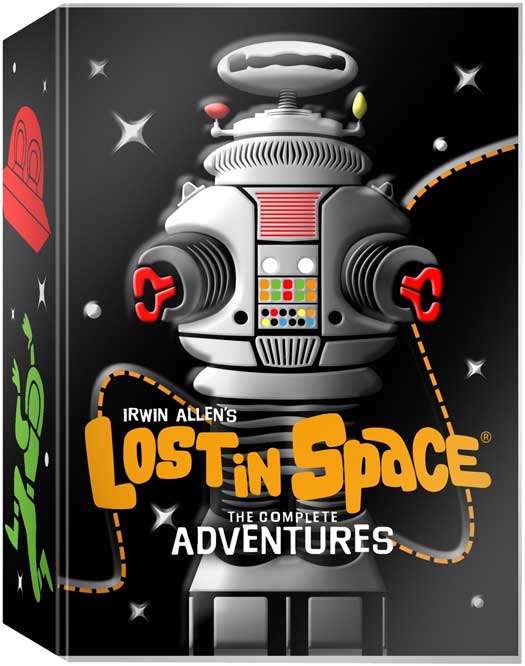
FeedbackJon Abbott responds to your feedback: Thanks to everyone who has commented on the interview and to Nigel for the cool layout. There are many aspects to my life AJ, including my long-suffering family, pop culture is maybe about thirty percent of it! Just want to point out to Mr. Lacker (who seems to have read the interview, rather than the book, which is fair enough) that the comments he was remarking on were opinions, like his, not facts, and no-one was attempting to rewrite history.
There are facts and there are opinions, and the book has many of both. Facts include the massive box office, whether it’s G.I. Blues (which I loathe) or, say, Blue Hawaii (which I love). If Marty ever looks at the book, and there’s no reason why he should, he will see that while I personally enjoy and defend the films, numerous different opinions of the movies are acknowledged and quoted throughout, including his on page 248, and that particular section ends with the words “the argument may rage forever”. But not between me and Marty, I hope. Let’s all remember what we each enjoyed about Elvis with good feelings instead of wallowing in could’ve’s and should’ve's. If nothing else, we have Elvis in common. And if "the colonel" was channelling through me, then he’s acquired a very low opinion of himself in the afterlife!! Yes, I would like to sell books, but you can rest assured I won’t be selling my integrity. EIN Note: The quote from Marty Lacker included by Jon Abbott in The Elvis Films is:
Simone: Thanks for the interesting interview with Jon Abbott. I’m not a big fan of Elvis movies but I do like my retro TV. David Waller: I enjoyed your interview with John Abott. As a kid of the 1960 and 1970s I spent many hours watching Robin Hood, William Tell The Avengers and all the american sitcoms. I also like Elvis’s films for what they are but they weren’t oscar winners. AJ: I read the EIN Interview.....It was HUGE!!!!! I agree with some of the things Jon Abbott said.......I must say I agreed much more with EIN's opinion on his book, etc. {I read it too }. It's hard for me to believe a grown man watching so many movies, etc. Harder still that he can make a living doing it !! If I was his wife...or any of his family......Afraid I'd have to exit his "life".... Jon Abbott said something about listening to him (Elvis) {his songs later } .......his voice, songs/words people could relate to......I'd agree. It was HIS voice, what he put into them that made Elvis what he was....That was indeed what I related to & caused me to like him & his music........I was in K.C. Mo. when I walked into my moms.....heard a song that touched me....and only then did I start listening to his music. It wasn't the R&R stuff , but his ballads ,sad songs I loved and related to ...in my own life. I could have listened to his voice all day......... soothing ,empathetic words, a man I could relate to......That's what I heard many years later when I saw him in person in Oklahoma too.... Kevin O: A good interview but I'm still confused about what makes some of Elvis's best films better than others and why. It seems to me that liking a film is a personal thing based on how a person feeels at the time. Elvis made a lot of films some which were good and others not so good and there was lots of fun in them. Marty Lacker: I read your story on Jon Abbot and I laughed when I read the list of topics he
is discussing in his book about Elvis, did Parker come back from the dead to
write this for him? I have never read such crap and a revision of history as to
what Parker supposedly did for Elvis. He protected him? His movies were great? Star Is Born would have been bad for him? Nothing like revising history and reality to sell a book.
EIN Website content © Copyright the Elvis Information Network.
|
|
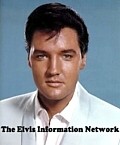

.jpg)
